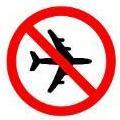the fuss about flags - a different take on things.
There's been a big fuss about flags this summer, with many people complaining that their enjoyment of acts at festivals have been spoilt by the huge number of people in front of them in the crowd with flags, blocking their view of the stage. They have a point - at times, particularly at Glastonbury's main stage, this long-running problem stepped very firmly into the realms of huge excess.
Why do some people have these flags?
At the most simple level, they have them because they think it's a fun thing to do, that it makes them different and special in some way. Except of course that with so many having flags, it doesn't make them different or special in any way.
With a more purposeful reason, they have a flag so that their mates can find them within a crowd, and I can see that this would work. Yet in my 28 years of attending festivals I've always managed to locate my friends in a crowd without the need of flags - but then again, I am taller than most, so I guess that does make a difference. But even so, it's still not a difficult thing to do even in the biggest crowds if you've told each other where you'll be.
And with little purpose? The modern disease as demonstrated by the likes of Facebook - "look at me, look at me". One day they'll realise that no one is looking, or that if they are they don't care.
Why the fuss right now?
It's the Reading and Leeds festivals this weekend, and they've taken the decision to ban flags.
Melvin Benn, the man behind these festivals, recently talked about that decision (reported here), saying that "I'm doing everything I can to ban flags this year. For some reason those that buy a flag want to be closest to the stage." and that at Glastonbury (which Melvin also has involvement in running) fans complained about the view during Bruce Springsteen's headline set in particular. "You couldn't see the acts. The flags were everywhere. There have always been flags but not to the level that there has been. And the flags have become very long and tall.".
So Melvin has reacted at Reading and Leeds with a ban, and says that he is also talking to Glastonbury founder Michael Eavis about introducing a ban there. All very worthy in the name of the paying customer. But....
When is a flag not a flag?
Melvin also said that some people were using flags to advertise goods.
That's more than a little over-stating things I feel, as although there are indeed company or product branded flags to be seen amongst the other flags, they're there I feel not directly in the hands of the company involved, but simply because that flag is the one that a particular festival goer has because it's come into their hands somehow, quite possibly because the company involved was giving them away as a promotional item at some point - in fact, much like the promotional things done with Melvin's backing and for his company's financial benefit at some of the festivals he's involved with.
For example, a certain drinks company gave away many hundreds of flags to festival goers earlier this summer, and they're bound to start being seen on poles in festival crowds sooner or later.
Melvin said that some people were using flags to advertise goods - and it seems a rather strange thing to include when it's of no relevance to anyone's blocked view. And I wonder if this is the heart of the matter. :angry:
When a festival organiser has taken a fat pocket of fifties from a drinks company for that drinks company to have the exclusive rights to sell their drinks to the festival attendees, and with the festival being broadcast all around the world, then that drinks company isn't going to be hugely pleased to see other drinks companies get better promotion - and for free rather than at huge expense - via their flags being seen on TV than that drinks sponsor is getting.
Is this flag ban, at least in part, a ban on festival-goers' fun for the commercial benefit of the festival organiser and the festival's sponsors? Or is it only because people's views are getting spoilt?



2 Comments
Recommended Comments